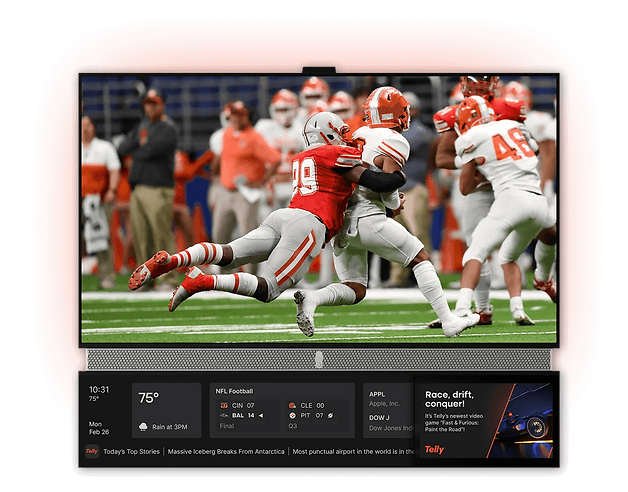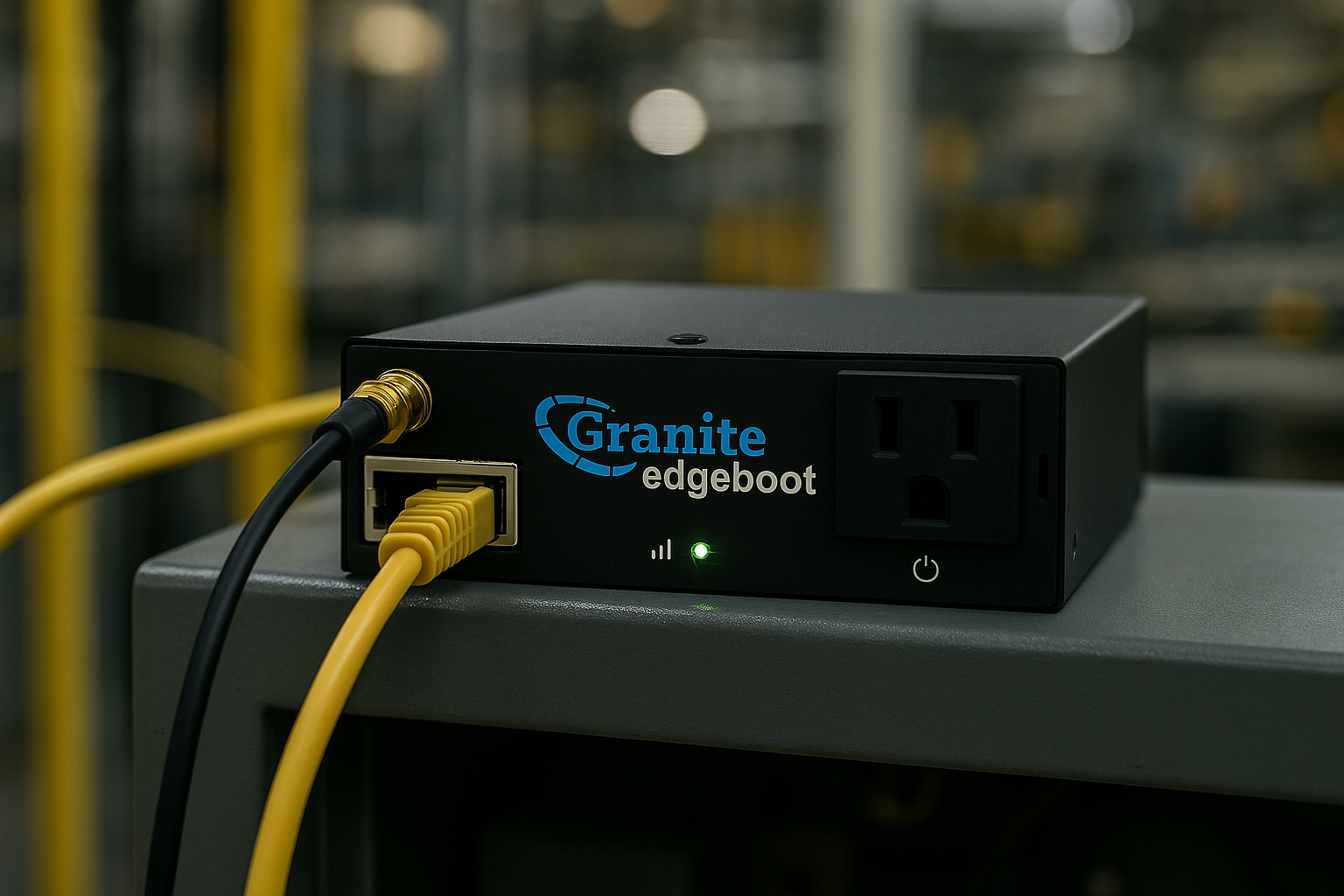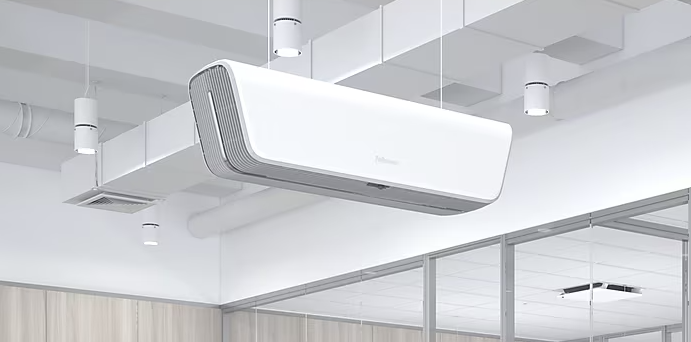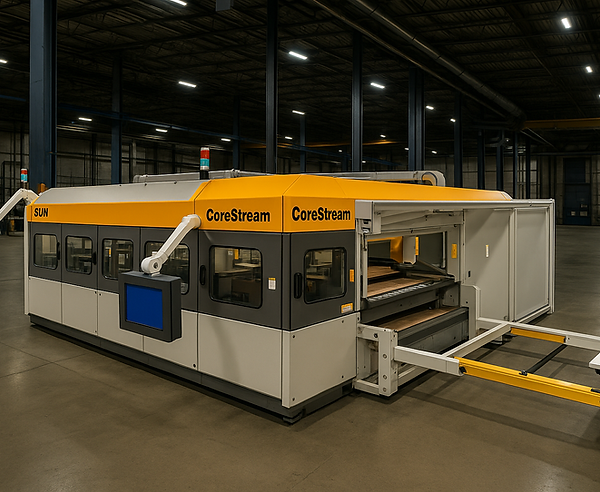How Telly Masters Rapid Software Delivery to Power the Next Generation of Consumer Electronics
Challenge: Managing Complex Software Updates at Scale
Telly has established a high-velocity development environment where dozens of software engineers work across multiple release trains, shipping updates to a massive fleet of devices. By implementing Peridio's platform, they've achieved what would typically require a dedicated team of engineers with just 1.5 engineers supporting the integration, allowing them to focus resources on product innovation rather than infrastructure maintenance.

100K+
Device Fleet: 100,000+ TVs in production with rapid growth
95%
Update Success: 95% completion rate within 7 days
1x Daily
Update Velocity: Multiple updates shipped internally daily
1x
Production Cadence: Monthly updates to customer devices
Background
Telly, a flagship Peridio customer, has revolutionized the TV experience with their innovative dual-screen design that provides more than just entertainment. Their platform offers:
- The primary top screen delivers sports, entertainment, and movies
- The secondary bottom screen (the smart screen) brings all new experiences to the living room like video calling, news, weather and sports updates, video games, and a fitness studio without interrupting the primary content.
According to Eric Loes, Head of Software Engineering at Telly: "You're only as successful as getting your software out to your hardware." This philosophy shaped their entire approach to product development.
Telly recognized early on that their success would be determined by their ability to ship exceptional software to their hardware fleet quickly and reliably. With ambitious plans to scale their device fleet into the hundreds of thousands, building a world-class software delivery system wasn't a nice-to-have—it was a fundamental requirement.
Key Challenges & Solutions
Build vs. Buy Decision
One of Telly's earliest strategic decisions was whether to build their firmware management system in-house or partner with a specialized platform. According to Eric: "It's hard to sell to finance or your CEO why you need to invest engineering and resourcing into a reliable system to deploy. Firmware update infrastructure is more or less a separate product line that needs maintaining."
While a basic AWS IoT implementation might have seemed sufficient initially, Telly recognized that production-ready features at scale would require substantial ongoing investment. Eric's prior experience at Vizio, where similar systems occupied many engineers—particularly for a software app store—convinced him a better approach was needed.
Managing High-Volume Software Development
With dozens of software engineers working on multiple release trains across 20+ unique applications, Telly required a sophisticated system that could:
- Enable high-velocity development and testing workflows
- Safely deploy updates to customer devices on a regular cadence
- Track update success rates across their growing device fleet
- Optimize bandwidth usage with targeted component updates
Peridio's platform provided the comprehensive solution they needed, allowing their engineering and test teams to ship updates internally multiple times daily while maintaining a cadence of monthly updates to their production fleet.
How Telly Uses Peridio
Telly was one of Peridio's earliest customers, and their feedback has been instrumental in shaping the platform's capabilities. Today, they leverage advanced features to support their unique business model and development velocity.
Cohort-Based Release Management
Telly has implemented a sophisticated five-tier cohort system that enables controlled rollouts and comprehensive testing:
- Nightly Debug Cohort: Daily builds for engineering testing
- Nightly User Cohort: Production-like testing without debug features
- Release User Debug Cohort: Release candidate validation
- Public Beta Release User Cohort: Early adopter feedback collection
- Partner Release Debug Cohort: Third-party vendor integration testing
This system allows Telly to create temporary release cohorts for specific feature testing or run parallel release trains, ensuring maximum development velocity without compromising stability.
Advanced Release Management
Telly leverages key aspects of the Peridio platform for their operations:
- Phased, Scheduled Releases: Controlled deployment to specific user segments
- Device Cohorts with Tag-Based Rollout: Precise targeting of updates
- Component-Based Updates: Optimized bandwidth usage and reduced package sizes
- Visualization and Analytics: Real-time insights into fleet performance
- Differential Updates: Managing 20+ unique applications across their TV ecosystem
As Eric explains: "When you scale out to 100,000, 200,000, 300,000+ devices, the need for differential updates and component updates becomes critical. The ability to update individual components rather than entire firmware—showing exactly what changed, why it changed, and what data transfer is happening—drives cost savings at scale."
Customer Support Integration
The integration capabilities of Peridio's platform have been particularly valuable in bridging Telly's engineering and customer support teams. According to Eric: "For a hardware/software product like ours, you absolutely need your support team and your engineering team working hand-in-hand. I've seen this problem before—when those teams don't communicate effectively, it's a disaster."
Peridio's APIs and webhooks enable Telly to provide their support team with direct access to device information and update status, creating a seamless connection between what customers experience and what engineers are working on.
Results
The implementation of Peridio has delivered impressive results for Telly:
Update Success Rate
An industry-leading 95% of devices complete updates within just 7 days of release (with plans to push this to 98%)
Monthly Production Updates
Consistent delivery to their entire device fleet
Multiple Daily Internal Builds
Supporting rapid development cycles
Streamlined Engineering
Managed with just 1.5 dedicated engineers
Advice for Teams Starting Out
Based on their experience, Telly offers valuable advice for teams implementing cohort-based deployment strategies:
- Establish a Flexible Foundation: Implement a versatile cohort and tagging system early to support future growth
- Start Small and Controlled: Begin with limited rollouts before expanding to your full device fleet
- Optimize Update Delivery: Break down large firmware packages into components for efficient distribution
- Automate from Day One: Build automation into your processes from the beginning
- Prioritize Monitoring: Focus particularly on update success rates to catch issues early
As Eric recommends: "You want to ensure your own success. The easiest success is bundle everything together and get that going, make sure that you're seeing updates within your KPI metrics, and then once you get that reliability, you can start enhancing it."
Looking Ahead
Telly continues to push the boundaries of what's possible with their firmware management approach. Their upcoming plans include silent updates, enhanced release note automation, and expanded testing capabilities.
Through their ongoing collaboration with Peridio, they've transformed firmware updates from a necessary maintenance task into a strategic advantage. With 95% of their device fleet successfully updating within a week of release, they can confidently deliver new features and improvements that enhance the user experience with each update cycle.
"It's hard to sell to finance or your CEO why you need to invest engineering and resourcing into a reliable system to deploy… Firmware update infrastructure is more or less a separate product line that needs maintaining."

Granite
Here's how Granite launched their EdgeBoot hardware line, enabling seamless remote diagnostics and unified customer management

Fellowes
Discover how Fellowes leveraged Peridio's device infrastructure platform to streamline firmware delivery, enhancing product reliability and customer satisfaction.

SUN Automation
Discover how SUN Automation securely manages AI-enabled manufacturing equipment while meeting strict Tier 1 security standards